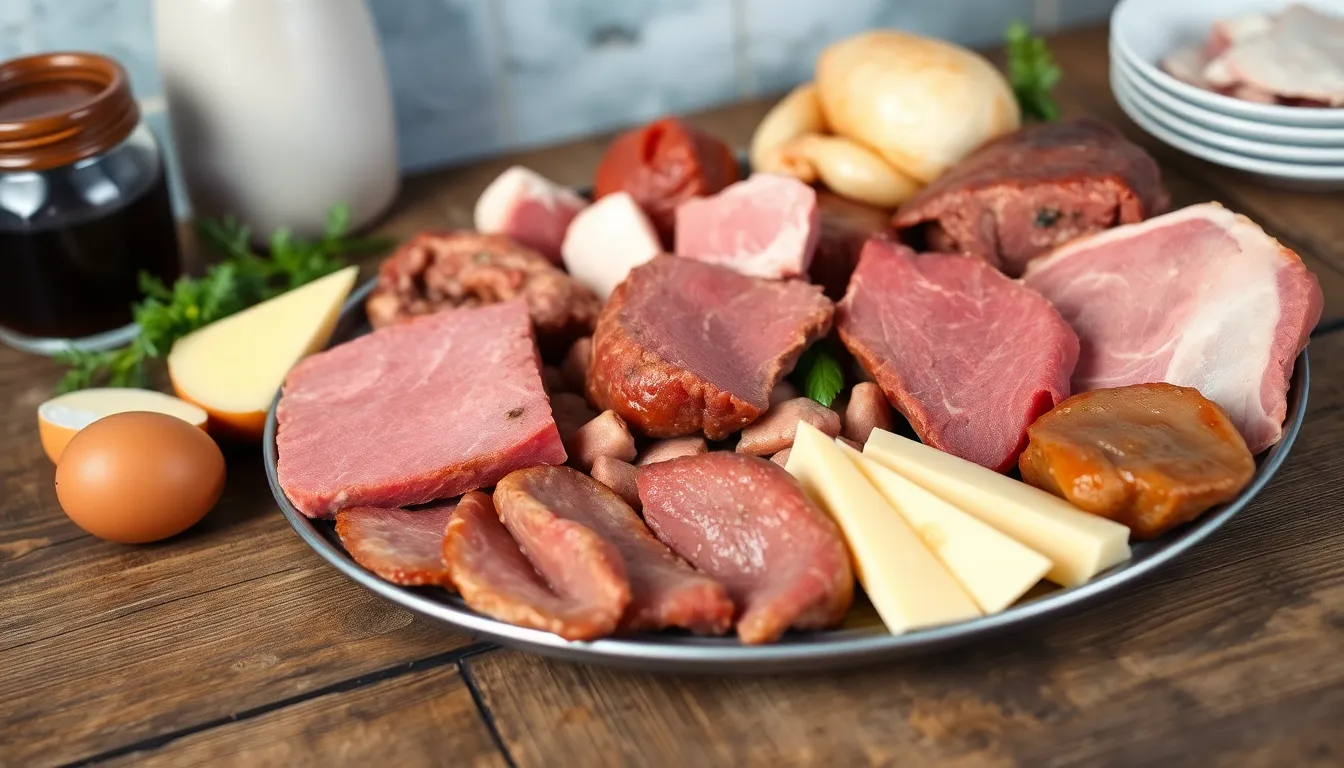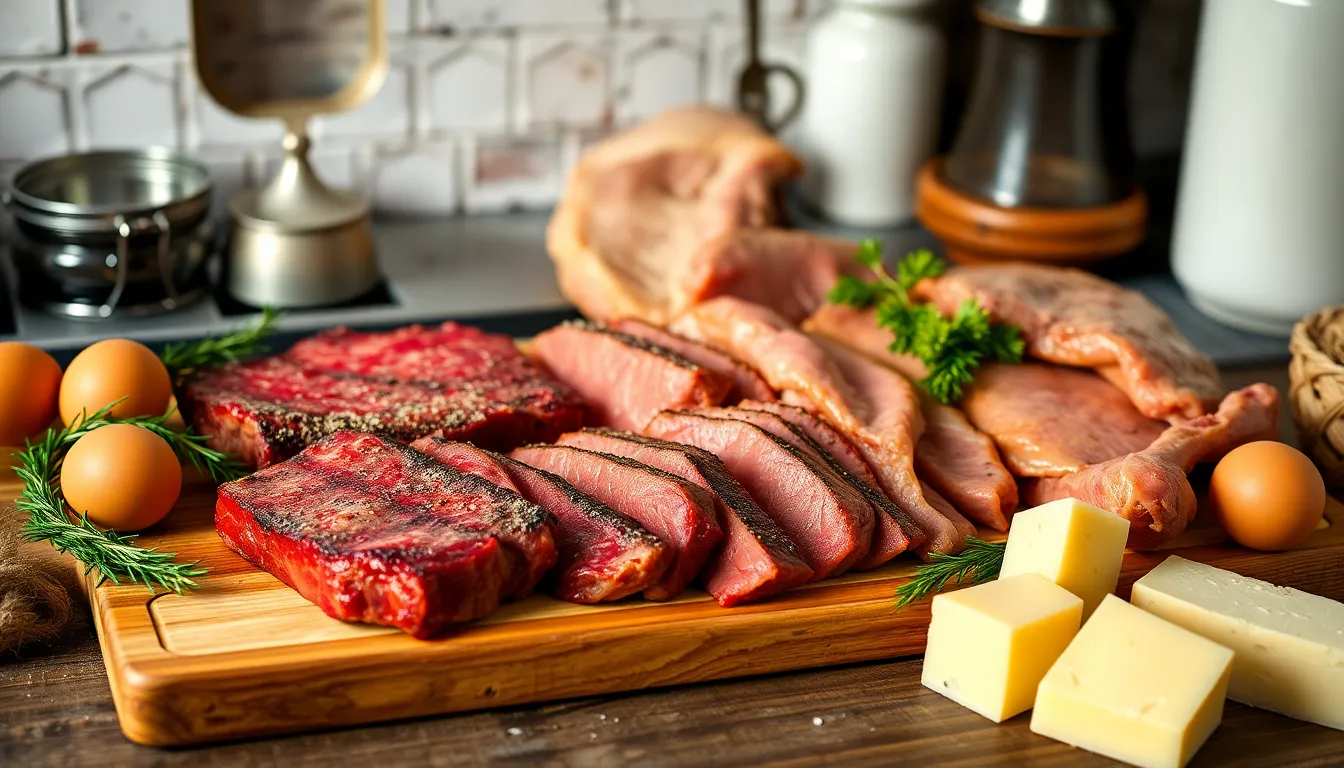The carnivore diet has taken the health world by storm, promising a meat-lover’s paradise while banishing carbs and plants to the dark corners of the pantry. But wait—what about those crunchy, tangy pickles that add a zing to any meal? Can these delightful cucumbers still find a place on your plate, or are they destined for the forbidden food list?
In a world where bacon reigns supreme, the thought of pickles might seem like a wild card. But before tossing them aside, let’s dive into the briny depths of this debate. After all, who wouldn’t want to spice up their carnivore journey with a little crunch? Buckle up as we explore whether pickles can join the meat parade or if they’re just a cheeky sidekick in a meat-centric lifestyle.
Table of Contents
ToggleUnderstanding The Carnivore Diet
The carnivore diet emphasizes consuming animal products exclusively, prioritizing meat, fish, and animal-derived ingredients. Followers often report various health benefits, including weight loss, improved mental clarity, and enhanced energy levels. A significant aspect of this diet is the complete avoidance of carbohydrates, which means eliminating fruits, vegetables, grains, and legumes.
Meat varieties include beef, pork, poultry, and seafood, serving as the primary sources of nutrition. Some adherents choose to also incorporate organ meats for their rich nutrient profiles. Dairy products are often a topic of debate within the carnivore community. Some individuals enjoy full-fat dairy while others exclude it to adhere strictly to the meat-based approach.
Transitioning to a carnivore diet can lead to significant dietary changes. Individuals adapt by experiencing initial symptoms like fatigue and digestive discomfort, which usually subside as the body adjusts. The lack of carbohydrates necessitates a shift in metabolism, often resulting in fat becoming the primary energy source.
Understanding these dynamics helps clarify the implications of this restrictive diet. The role of pickles, typically derived from vegetables, requires consideration. Questions arise regarding their compatibility with the fundamental principles of the carnivore diet. As the exploration of this question continues, readers will uncover the nuances of including or excluding certain flavors in a meat-focused lifestyle.
Key Principles Of The Carnivore Diet


The carnivore diet centers on consuming animal-based products exclusively. This approach encourages followers to derive their nutrition solely from meat and animal derivatives.
Allowed Foods
Meat, fish, and animal-based products form the foundation of the carnivore diet. Beef, pork, chicken, and lamb qualify as primary protein sources. Fish varieties such as salmon and tuna also fit within this regimen. Many adherents include organ meats like liver and kidney for their nutrient density. Eggs and certain dairy products, like cheese and butter, may be included based on individual preferences. Water and salt typically serve as essential beverages and seasonings.
Restricted Foods
Plant foods find no place in the carnivore diet. Vegetables, fruits, grains, and legumes are strictly excluded. Sugary and processed foods also fall under the restricted category. This eliminates items like bread, pasta, and snacks containing carbohydrates. Beverages like coffee, tea, and soft drinks, which contain plant derivatives, do not align with the diet’s principles. Strict adherence to these restrictions solidifies the focus on animal products only.
Nutritional Profile Of Pickles
Pickles offer unique flavors and some nutritional value. Understanding their ingredients and health benefits helps clarify their place in the carnivore diet discussion.
Ingredients In Pickles
Pickles primarily consist of cucumbers, salt, vinegar, and water. They often contain spices like dill, garlic, and mustard seeds for flavor enhancement. For some recipes, sugar and preservatives may be added. Using grains like mustard seeds can impact the overall carbohydrate content. Whole cucumbers typically undergo fermentation, which preserves them and introduces probiotics. These natural components differentiate pickles from animal products on the carnivore diet, raising questions about their compatibility.
Health Benefits Of Pickles
Pickles present several health benefits that some may find appealing. They provide low calories and can contribute to hydration due to their high water content. Additionally, pickles contain antioxidants that help combat oxidative stress. The fermentation process boosts gut health by introducing beneficial probiotics, which support digestive wellness. While pickles contribute certain vitamins and minerals, they also contain sodium, which can impact individuals with certain dietary restrictions. Readers should weigh these benefits against the principles of a strict carnivore diet.
Can You Eat Pickles On Carnivore Diet?
Including pickles in the carnivore diet raises important questions, primarily due to their vegetable roots. Seasoned followers often debate whether these tangy treats fit into a strict meat-based regimen.
Potential Considerations
Considering the primary components of pickles reveals key nutritional factors. Pickles consist mainly of cucumbers, vinegar, and salt, with added spices. Most versions contain minimal carbohydrates but high sodium levels, which might not align with the diet’s low-carb focus. Fermented varieties introduce probiotics, offering gut health benefits but derive from plant sources. Evaluating these aspects against the carnivore diet’s emphasis on animal products highlights potential conflicts. Individuals following the diet typically prioritize meat, so incorporating pickles could compromise adherence to its principles.
Alternatives To Pickles
Exploring alternatives can provide flavorful options while adhering to carnivore guidelines. Fermented foods made from animal products, such as sauerkraut made with animal fats, offer a similar tang without vegetable content. Pickled vegetables made with fish or meat brine can serve as substitutes, providing a unique taste experience. Consider using aged cheeses or smoked meats to add zest to meals without straying from dietary principles. Bone broth, infused with spices, also enhances flavor and provides nutrients. Exploring these alternatives encourages creativity while staying true to the carnivore diet.

